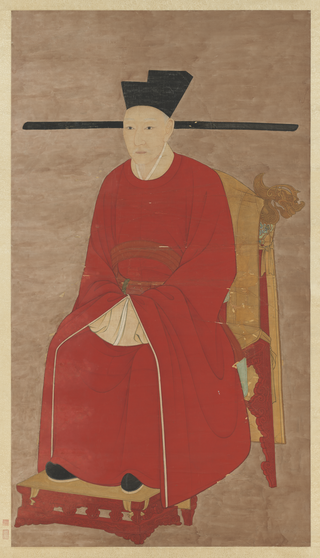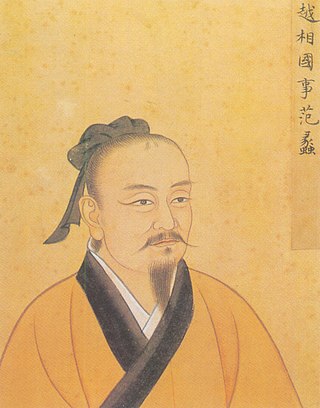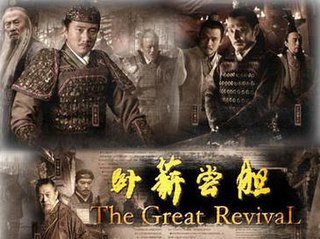Related Research Articles

Yue Fei, courtesy name Pengju (鵬舉) was a Chinese military general who lived during the Southern Song dynasty and considered a national hero of China, known for leading Southern Song forces in the wars in the 12th century between Southern Song and the Jurchen-ruled Jin dynasty in northern China. Because of his warlike stance, he was put to death by the Southern Song government in 1142 under a concocted charge, after a negotiated peace was achieved with the Jurchens. Yue Fei is depicted in the Wu Shuang Pu by Jin Guliang.

Emperor Gaozong of Song, personal name Zhao Gou, courtesy name Deji, was the tenth emperor of the Song dynasty and the first of the Southern Song period, ruling between 1127 and 1162 and retaining power as retired emperor from 1162 until his death in 1187. The ninth son of Emperor Huizong and a younger half-brother of Emperor Qinzong, Zhao Gou was not present in the capital of Bianjing when it fell to the Jurchen-led Jin dynasty in 1127. Narrowly avoiding capture by Jin forces, he escaped first to Yangzhou and then Lin'an, assuming the throne and reestablishing the Song court. Despite initial setbacks, including Jin invasions and a brief deposition in 1129, Emperor Gaozong consolidated his political position and presided over the continued military conflict with Jin. Prior to 1141, military commanders including Han Shizhong and Yue Fei reconquered portions of the Central Plains while chancellors like Lü Yihao, Zhao Ding, Zhang Jun, and Qin Hui managed the civil bureaucracy.

Fan Li (October 22, 536 BC - 448 BC) from the Spring and Autumn period, was an ancient Chinese military strategist, politician, and businessman. Fàn Li was an important political and military advisor to Goujian, the king of Yue. He later was known as Tao Zhu Gong (陶朱公) a name he took after achieving a decisive victory for Yue over the state of Wu and retiring to live a secluded life with his wife Xi Shi, one of the most famous beauties in Chinese history.

The Republic of China (Taiwan) competed at the 1972 Summer Olympics in Munich for the last time as the "Republic of China". The ROC would not return to the Olympics until 1984 and under the name "Chinese Taipei" due to objections by the People's Republic of China over the political status of Taiwan.

The People's Republic of China competed at the 2000 Summer Olympics in Sydney, Australia. The team excluded athletes from the Special Administrative Region of Hong Kong, after the territory's return to Chinese rule in 1997, and which competed separately as Hong Kong, China.

Romance of the Three Kingdoms is a Chinese television series adapted from the classical 14th century novel of the same title by Luo Guanzhong. The series was produced by China Central Television (CCTV) and was first aired on the network in 1994. It spanned a total of 84 episodes, each approximately 45 minutes long. One of the most expensive television series produced at the time, the project was completed over four years and involved over 400,000 cast and crew members, including divisions of the People's Liberation Army from the Beijing, Nanjing and Chengdu military regions. Some of the dialogues spoken by characters were adapted directly from the novel. Extensive battle scenes, such as the battles of Guandu, Red Cliffs and Xiaoting, were also live-acted.

The China men's national basketball team represents the People's Republic of China in international basketball tournaments. The national team is governed by the Chinese Basketball Association (CBA). Based on the number of tournament titles, China is considered a major basketball powerhouse in Asia and has by far the most successful basketball program on the continent.

Taiwan competed at the 1968 Summer Olympics in Mexico City, Mexico. 43 competitors, 35 men and 8 women, took part in 57 events in 8 sports.

The Great Revival, also known as Wo Xin Chang Dan, is a Chinese television series based on the conflict between the Yue and Wu states in the Spring and Autumn period. The Chinese title of the series is a Chinese idiom derived from King Goujian of Yue's perseverance in overcoming the odds to revive his fallen state of Yue and conquer the rival state of Wu. The series was first broadcast on CCTV-8 in mainland China in January 2007.

All Men Are Brothers is a 2011 Chinese television series adapted from Shi Nai'an's 14th century novel Water Margin, one of the Four Great Classical Novels of Chinese literature. The series is directed by Kuk Kwok-leung and features cast members from mainland China, Taiwan and Hong Kong. The series was first broadcast on 8TV in March 2011 in Malaysia.

Justice Bao is a Chinese TV series starring producer Jin Chao-chun as the Song dynasty official Bao Zheng. The series ran for 3 seasons from 2010 to 2012. In addition to Jin, Kenny Ho, Fan Hung-hsuan and Lung Lung again reprise their iconic roles from the 1993 Taiwanese hit Justice Pao and the 2008 Chinese series Justice Bao.

Sunny Piggy is a 2000 Chinese romantic fantasy comedy-drama television series. It stars Xu Zheng as Zhu Bajie, a foolish pig who wanted to become human, and Tao Hong as a kindhearted dragon princess who loved him unconditionally until her death. Most characters, including Zhu Bajie, are taken from the 16th-century novel Journey to the West and Chinese mythology.
The National Theater of China or National Theater Company of China, based in Beijing, is China's national theatrical company, founded on December 25, 2001 with the merger of China National Youth Theater and China National Experimental Theater.

Legend of Nine Tails Fox is a 2016 Chinese television series based on six tales in Strange Stories from a Chinese Studio by Pu Songling. It originally aired two episodes daily on Hunan TV, Sunday through Tuesday at 22:00 as well as simultaneously broadcast online on Youku, Tencent, Sohu and iQiyi. The drama was directed by Liu Yufen, Gao Linbao and Xu Huikang, and stars an ensemble cast of actors. The drama is separated into six plots based on the corresponding stories in the Strange Tales from a Chinese Studio.

Wan-chun is a 1990 Taiwanese television series produced by Ping Hsin-tao and his company Yi Ren Communications Co. (怡人傳播公司) in conjunction with Chinese Television System, based on Chiung Yao's 1964 novellette Wan-chun's Three Loves, which is set in Republican era Beijing.
Wang Fan is a Chinese beach volleyball player. She competed alongside Yue Yuan in the women's beach volleyball tournament at the 2016 Summer Olympics.
Yue Yuan is a Chinese beach volleyball player. She competed alongside Wang Fan in the women's beach volleyball tournament in the 2016 Summer Olympics.
A Dream of Red Mansions is a Chinese serial feature film produced by Beijing Film Studio, released in 6 parts between 1988 and 1989. Directed by Xie Tieli (谢铁骊) and Zhao Yuan (赵元), it is a cinematic adaptation of the 18th-century Chinese novel of the same name. The film took two years to prepare and three years to shoot, and remains, at 735 minutes, the longest ever made in the People's Republic of China.
Liu Hong (236–306), courtesy name Heji or Shuhe, was a military general and politician of the Jin dynasty (266–420). He was most known for his role as Inspector of Jingzhou between 303 and 306. After quelling the revolt of Zhang Chang, Liu Hong ushered Jingzhou into a brief period of peace and stability, making it a haven for refugees fleeing the civil war and rebellions happening throughout most of China. Liu Hong was a venerated figure among the people, and traditional historians praised him as a model governor. After his death, his successors failed to match his standard of governance, leading to uprisings that would affect southern China for more than a decade.
References
- ↑ "Fan Yue-tao Olympic Results". sports-reference.com. Archived from the original on 18 April 2020. Retrieved 20 September 2014.